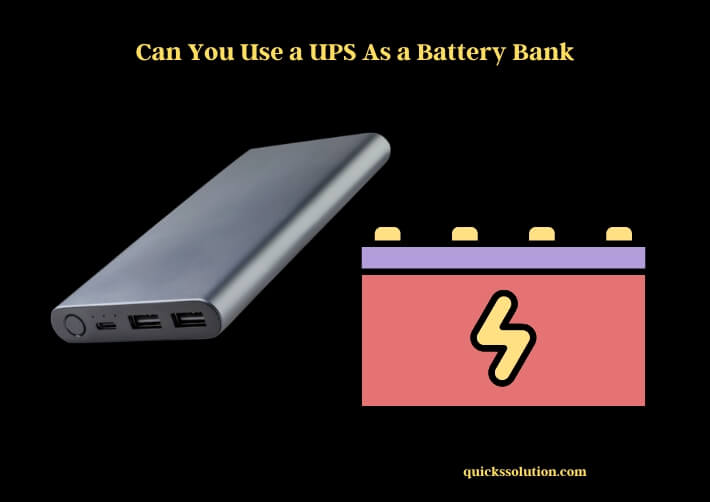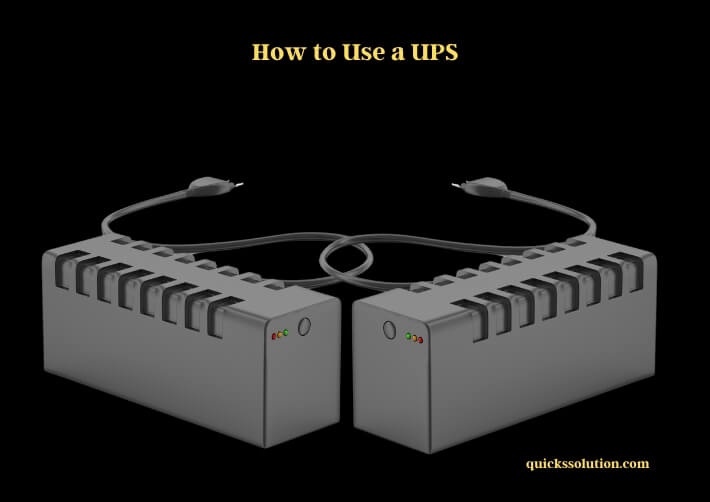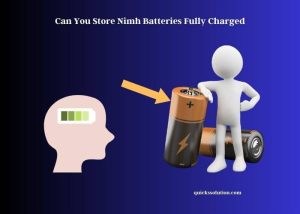Published on: May 3, 2024
Written by John Stevens / Fact-checked by Hashim Manna
We’ve probably seen UPS devices in corporate offices and server rooms. They provide backup power in the event of a power outage, keeping critical systems up and running. But what we may not know is that we can use a UPS as a battery bank.

Yes, we can use a UPS as a battery bank. Probably it will be best choice for us to use UPS as a battery bank. It will help us to complete our pending work.
In this post, we’ll know how to do just that. We’ll also discuss the benefits and lacking’s of using a UPS as my battery bank. So, if we are considering this option for our home or office, we have to read carefully below-
- Connect the UPS to our computer by using the provided USB cable;
- When the UPS is connected, open the software and select the “Battery Backup” option;
- Choose how long we want the battery backup to last, and click “Start“;
- The UPS will now provide power to our computer in the event of a power outage;
Can I Use UPS As a Power Bank?
Yes, I can use UPS as a power bank. A UPS is an Uninterruptible Power Supply, which means that it provides backup power in the event of a power outage. This makes it ideal for use as a power bank, as it can keep my devices powered on during a blackout.
There are some things to keep in mind when using UPS as a power bank. First, UPS systems are designed to provide short-term backup power, so they may not be able to fully charge my devices. Second, UPS systems can get quite hot during operation, so it’s important to make sure that my devices are well-ventilated.
Most UPS systems have a limited number of outlets, so I will need to plan ahead if I want to charge multiple devices at once.
Can You Use UPS As Portable Battery?
Yes, I can use UPS as portable battery. It is convenient because UPS provides instant power and protection for my devices during a power outage. There are some things to consider before using UPS as portable battery. They are given below-
By Checking Balance
Check the balance of my devices with the UPS. Some devices may not be compatible with all UPS models.
Consider the Size of the UPS
The larger the unit, the more weight it will add to my bag.
Backup Power
I have to think about how long I will need backup power. A UPS with a longer runtime will be more expensive but it will keep my devices powered up for a longer period of time.
Read the Reviews Before Purchasing a UPS
I have to make sure to read the reviews before purchasing a UPS. This will help me find a reliable model that meets my needs.
Can I Use a UPS As a Power Supply?
UPS units, or continuous power supplies, are devices that provide backup power in the event of an electrical outage. They are often used in businesses and other commercial settings to ensure that critical equipment remains powered on during a power failure. However, UPS units can also be used in residential settings for the same purpose.
Using a UPS unit as a power supply is not difficult, but there are some things I have to keep in mind.

Backup Power
UPS units are designed to provide backup power for a limited time – usually just long enough for critical equipment to be shut down safely in the event of a power failure. As such, they are not meant to be used as a primary power source.
Size of UPS
UPS units must be properly sized for the equipment they will be powering. Using a UPS that is too small could result in it being overwhelmed by the load and failing to provide adequate backup power when needed.
Finally, it is important to make sure that the UPS unit is properly ventilated so that it does not overheat and fail prematurely.
Overall, using a UPS as a power supply is perfectly fine as long as I keep these considerations in mind.
Is UPS the Same As Battery Backup?
There are a lot of people out there who seem to think that UPS is the same thing as a battery backup. This couldn’t be further from the truth! While both UPS and battery backup systems provide power to our devices in the event of a power outage, they do so in very different ways.
Here’s a look at the key differences between UPS and battery backup systems: UPS systems work by providing an uninterrupted flow of power to our devices, even when there is an obstacle in the main power supply. They do this by using batteries to bridge the gap between when the power goes out and when the UPS can kick in and take over.
Battery backup systems, on the other hand, simply provide a reserve of power that can be used in case of an outage. Once the power goes out, we will need to manually switch your devices over to run off of the battery backup system. So, which is better?
That really depends on what we need it for. If we need something that will keep our devices running during short blackouts or brownouts, then a UPS system is probably a better choice. However, if we’re looking for something to keep our devices running during extended outages, then a battery backup system might be more appropriate.
Can a 12V 7AH UPS Inverter ( 220v ) Run with a 14.8V 150AH Battery ?
Using a Portable Power Station As a UPS
A UPS, or uninterruptible power supply, is a device that provides backup power in the event of a power outage. A portable power station is a type of UPS that can be used to provide backup power for small electronic devices, like laptops and cell phones. In the event of a power outage, a portable power station can be used to keep our devices powered up.
The station uses batteries to store energy, and it can be plugged into an outlet to recharge. When the power goes out, the station will automatically switch to battery power and provide enough juice to keep our devices running for several hours. A portable power station is a great way to ensure that we always have backup power available.
Keep one in your home and one in your office so that you’re never caught without a charge.
Difference between UPS And Power Bank
When it comes to portable power, there are two main types of devices: UPS and power bank. Both have their own advantages and disadvantages, so it’s important to know the difference before choosing which one is right for us. UPS stands for uninterruptible power supply.
It is a device that provides backup power in the event of a power outage. A UPS has its own battery that kicks in when the electricity goes out, allowing us to keep our devices powered on and running for a limited time. The biggest advantage of a UPS is that it can prevent data loss due to sudden power outages.
Power banks are portable devices that store energy in batteries so we can charge our devices when we go out for long time for picnic or tour where not option for recharge our devices. Power banks come in all shapes and sizes, and some even have multiple ports so we can charge multiple devices at once. The major advantage of a power bank is convenience – if we’re away from an outlet, we can still charge our phone or tablet using a power bank.
So, which one should you choose? If you’re looking for something to keep your devices running during a power outage, then a UPS is the way to go. Read more: Can I Replace Laptop Battery With Higher Capacity Battery?
UPS Battery Backup 24 Hours
A UPS, or uninterruptible power supply, is essentially a large battery that can provide power to our home in case of an outage. Most UPS units are designed to last for several hours, and some even come with built-in generators. There are several things to consider when choosing a UPS unit.
How Long We Want It to Last
If we only need a few hours of backup power, then a smaller unit will enough. However, if we want to be able to keep our fridge and freezer running for days or even weeks, then we’ll need a larger unit.
What Kind of Devices We Want to Keep Powered During an Outage
If all we need is a few lights and maybe a TV, then again, a smaller unit will do the trick. But if we want to keep larger appliances like refrigerators and freezers running, then we will need something bigger.
Finally, we have to think about any special features that might be important to us. Some UPS units come with USB ports so they can double as chargers for phones and laptops and others come with climate control features so they can help keep our food from spoiling in extreme temperatures.
Can I Use a Power Bank As a Power Source
A power bank can be a lifesaver. But what exactly is a power bank, and can it serve as a permanent power source? A power bank is essentially a portable battery that we can use to charge our devices on the go.
Most power banks are small enough to fit in our pocket or purse, making them easy to take with us wherever we go. So, can we use a power bank as a permanent power source? The short answer is yes!
There are some things to keep in mind before using one as your primary charger.
To Make Sure That the Power Bank is Fully Charged
By making sure that the power bank is fully charged before using it, We will go to outside without any sufferings.
Limited Charging Capacities
Keep in mind that most power banks have limited charging capacities. This means that they will eventually need to be recharged themselves after extended use. Remember that not all devices are compatible with all types of chargers.
How to Use a UPS
When we get a new UPS, once the battery is charged, first we have to test it. For example, plug in a radio and a desk lamp, then pull the UPS power cable from the wall (gently).
Label the UPS with the date when we started to using it. When we need to replace the battery, update the label.
Then we have to put it somewhere ventilated and not too dusty. If that place is dirty then the UPS can damage.

Most, UPSs today include a USB port, and monitoring software, which can help us be aware when a battery needs replacement, or there’s some other problem. Standard UPS batteries are typically good for two to five years. If the UPS reach that time then replace it.
UPS That Can Last for Hours
There are actually some UPS systems out there that can last for hours! Here are a few things to keep in mind when choosing a UPS system:
First, to make sure that the UPS system you choose has enough power to handle our needs. If we have a lot of devices that need to be plugged in, then we’ll need a UPS with more power. Second, we should consider how long we need the UPS to last.
If we only need it for short power outages, then a smaller UPS will suffice. However, if we live in an area with longer power outages, then we’ll need a UPS that can last for several hours. Finally, make sure to factor in the price when making decision.
Some UPS systems can be quite expensive, so we have to be sure to shop around and find one that fits our budget. If we keep these things in mind when choosing a UPS system, then we’re sure to find one that will meet our needs and provide reliable backup power for hours on end!
UPS Battery Backup, 8 Hours
If you live in an area where power outages are common, or if you simply want to be prepared for any eventuality, a UPS battery backup is a great investment. A UPS, or uninterruptible power supply, provides backup power in the event of a power outage. Most UPS systems can provide up to eight hours of backup power.
There are several things to consider when choosing a UPS system. The first is how much power we need. If we have a lot of electronics that need to be powered during an outage, we’ll need a higher-capacity UPS.
The second is what type of batteries we want to use. Lead-acid batteries are the most common, but they’re also the heaviest and require more maintenance than other types of batteries. Lithium-ion batteries are becoming more popular because they’re lighter and require less maintenance, but they’re also more expensive.
Once we’ve decided on the right UPS for our needs, it’s important to keep it properly maintained. Check the batteries regularly and replace them as needed. When not in use, store the UPS in a cool, dry place out of direct sunlight.
UPS That Can Last for 3 Hours
A 3-hour UPS. A UPS is a device that provides backup power in the event of a power outage.
It is designed to provide backup power for three hours, which is enough time to get our generator up and running or for the utility company to restore power. There are many benefits to using a 3-hour UPS, including Increased uptime.
Enough Backup Power
With a 3-hour UPS, we can be sure that we have enough backup power to last through even the longest outage. With a 3-hour UPS, we won’t be left in the dark if there’s a blackout.
Improved Productivity
If our business relies on computers and other electronic equipment, then downtime can be costly. Having a 3-hour UPS will help improve productivity by minimizing disruptions caused by power outages.
Conclusion
A UPS, or uninterrupted power supply, is a device that provides backup power in case of an outage. A UPS can be used to provide power to our home or office in the event of a power outage, and it can also be used to charge batteries.
You can connect a UPS to your home’s electrical system and use it to charge batteries during an outage.




